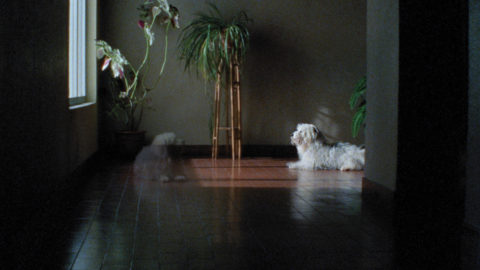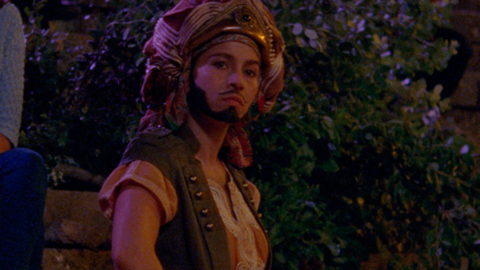Film of the Week: Arabian Nights

Never mind being naïve enough to imagine ever seeing a film that will change the world, but even the most hardened critics, in their heart of hearts, come to Cannes with the dream at the back of their minds that at some point, we’ll see one film that will at least change cinema. Most years, that dream is pretty comprehensively disappointed, and this year it has indeed been disappointed day after day, in a festival that offered the most mundane official selection in recent memory. The keynote was set by Emmanuelle Bercot’s opening film La Tête Haute (Standing Tall), an unassuming if engaging social drama in which Catherine Deneuve is a juvenile court judge presiding over the fortunes of a young offender. In reality, Deneuve is playing an idealized version of the French state itself, ever patient and compassionate, and that was clearly just the reassuring image that people felt they needed in these tough times: since its release in France last week, the film has been a major box-office success.
Critics, of course, don’t come to Cannes for that sort of easy reassurance—we’d rather witness the most despairing jeremiads, as long as they come with a twist of inspiration. And in the festival’s official selection, there were scant traces of that—except in Laszlo Nemes’s fearlessly severe Holocaust drama Son of Saul, the one film of the 2015 competition guaranteed to fuel substantial debate over the next year. (Here’s Eugene Hernandez on it, for starters.)
But for a response to current events that was politically and artistically miles from the norm, you had to look to an extraordinary one-off phenomenon in Directors’ Fortnight. This was Arabian Nights, an authentically sui generis six-hour, three-part offering from Miguel Gomes, the Portuguese director of Our Beloved Month of August (08) and the deliciously confounding, fabulist confection Tabu (12), a postcolonial romance about a man, a woman, and “a sad and melancholy crocodile.” Tabu especially reveals Gomes as a man who likes telling stories, but at the start of his new work’s first “volume,” Arabian Nights: The Restless One, Gomes appears on camera to muse over how difficult it is for him now to pursue his project of making a film similarly devoted to storytelling. Portugal, he points out, is in economic crisis, the government having imposed a brutal set of austerity measures in recent years that have exacerbated mass unemployment and destroyed the lives of large swathes of the population of an already challenged country. For someone with the enviable and privileged job of making films, Gomes worries, how is it possible to merely spin yarns in such a climate? And he gets up from his table and flees, his bewildered crew picking up their cameras and booms and heading off in hot pursuit.

The exact relevance of the original 1001 Nights to Gomes’s project only becomes apparent after a while—after he has fused together pieces of reportage on two completely different events that happen to be going on in Portugal at the same time at the same place, in the Northern town of Viana do Castelo, a shipyard closure and an attempt to combat an invasion of wasps. Then comes the premise, expounded via a visit to a fabulous Kismet-like episode with princesses, sailboats, camels, turbans, and the finest silks of Araby. Scheherazade saved the people of old Baghdad by telling stories to beguile her angry husband the King; Gomes’s film will use the structure of the Arabian Nights to beguile the times, fulfilling its social responsibility by capturing the realities of hard-times Portugal, but also spinning tales as whimsical and baroque as the director happens to fancy.
What we get is an episodic, fragmentary, digressive ragbag of different stories, genres, techniques, voices—sometimes manifestly artificed, sometimes seemingly giving us straight documentary, but for much of the time, walking a perplexing line between fiction and documentary, much as Gomes did in Our Beloved Month of August, in which real-life firefighters and carnival-troupe performers suddenly found themselves playing their own roles in a melodrama narrative.
And so, over six hours, Gomes’s film goes wherever it wants. At one moment, we’re in a fanciful version of old Baghdad, or on a sun-kissed rocky coast (in reality, somewhere around Marseilles), where the beautiful Scheherazade (Crista Alfaiate) dallies with a succession of admirers who certainly never featured in the original Nights: one is a priapic beach boy named Paddleman (Carloto Cotta, the dashing lover in Tabu), another a break-dancer named Elvis. The next moment, we’re on a Lisbon housing estate, watching the poignant story of a small dog named Dixie as it passes from owner to owner. There’s an outrageous ribald episode (the film’s one piece of overt political satire) in which assorted Portuguese ministers, bankers, and economists are endowed with a form of metaphysical Viagra (the episode is called “The Men With Hard-Ons” and features the sublime English subtitle: “Oh melancholy man, tell me the truth—does your willy wiggle?”). There’s the epic tale of a swimming club for the unemployed (“The Bath of the Magnificents”) which takes in a series of testimonies from assorted real-life Magnificents, and ends in documentary mode with a joyous mass swim on a chilly-looking New Year’s Day. And there’s an extended piece of pure Manoel de Oliveira (to whose memory Gomes dedicated the film onstage), a Brechtian piece of outdoor theater about a courtroom trial involving a pantomime cow and several people in fanciful demon masks. (Put it down to Cannes fatigue, or perhaps to the inordinate length and prolix literariness of this episode, but I couldn’t begin to focus on its drift; but then I did say it was pure Oliveira.)

Arabian Nights is constantly surprising and mutable, hugely entertaining, and to tell the truth, at times a little boring and repetitive—you feel at points that Gomes is over-stretching his material, or simply getting over-fixated on episodes that don’t quite sustain their interest. But in this sense the film has much in common with the “loose baggy monsters” of the experimental novel tradition—hyper-digressive, multidimensional creations such as Don Quixote, Tristram Shandy, Moby-Dick, your Thomas Pynchons and David Foster Wallaces. A little boredom comes with the terrain and makes the surprises more vivid. And there are surprises aplenty, not least on the musical front: the old Latin jazz classic “Perfidia” threads its way through in a multitude of cover versions, Eighties power balladry brings tears to the eye in Dixie’s story, and Volume Three takes the ostensibly cringesome “Calling Occupants of Interplanetary Craft” (by the forgotten Klaatu, better known by the Carpenters cover) and makes it its own, not least by using it as the theme for an impromptu tortoise race.
Gomes, you may be thinking, is a wild and creative guy—and yes, indeed he is. But actually, the message of the film is that it is the times themselves, and the people who live through them, that are wild and creative, generating stories no matter how much harsh political conditions might tend to purge the world of narrative exuberance. The Arabian Nights, as each volume’s opening titles remind us of the film’s source, simply provide a structure for coverage of events in contemporary Portugal. And here’s one of the most significant aspects of the work’s radicalism—its innovative process of preparation. Gomes arranged for a team of journalists to fan out over Portugal, interview people, and bring back real-life stories that could be used in the film. The stories were then submitted as research topics to a “Central Committee” which voted on which ones to use, then started forging narratives out of them. Then, as Gomes puts it in his production diary, “in the shortest time possible, the terrified production team will have to find actors, negotiate rehearsals, arrange for sets, and hire a technical team to film that tale. This is how things should run in this office for twelve months.” Apichatpong Weerasethakul’s regular DP Sayombhu Mukdeeprom—who shot in ’scope on 16mm and 35mm, in a variety of contrasting textures and intensities—moved to Lisbon for a year to work on the film, with no idea what the team would be shooting. As far as winging it goes, this is as extreme as it gets: the methods of news reportage and documentary applied to the fabrication of narrative.
It pays off magnificently—at the very least, Gomes and his collaborators have invented an entirely new approach for looking at the real world through an optic that distorts it, defamiliarizes it, and restores to it a rich, poetic form of truth. Just as the film’s fantasy Arabia takes on the colors of the everyday, the concrete realities of contemporary Portuguese working-class life (whether it’s the struggles of firefighters, the subculture of chaffinch hunting and birdsong competitions, or the neighborhood arguments caused by the disruptive crowing of a pet cockerel), all this becomes as fabulous and entrancing as any tale of princes and genies. But there are genies here too, and exploding whales, and politicians with erectile issues. It’s all in the nature of a good story, and Gomes’s stories, even if we only get six hours’ worth, could go on forever. In the real world, they’re going on still.






